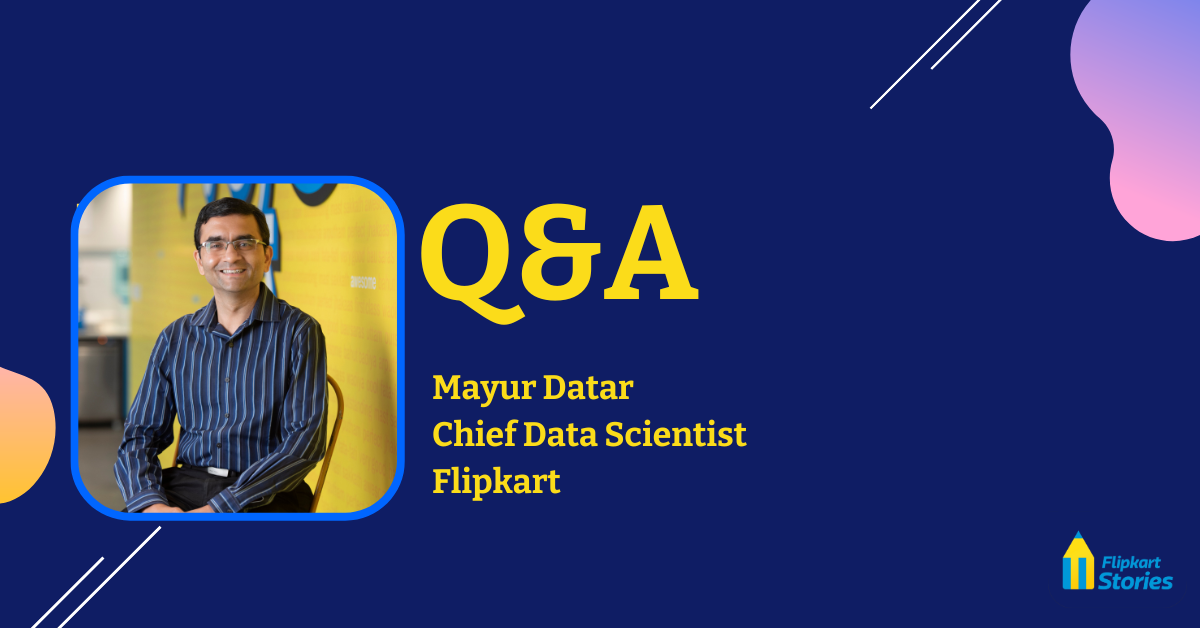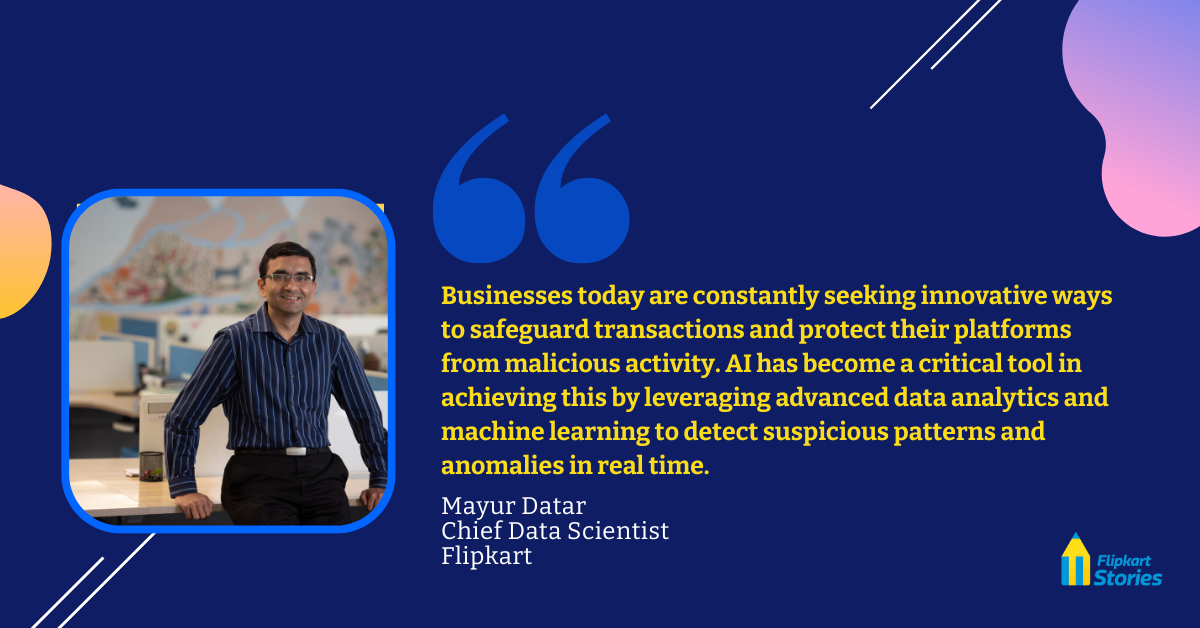In an ever-evolving e-commerce landscape, Flipkart is harnessing the power of Artificial Intelligence (AI) to transform the customer experience and streamline operations. Mayur Datar, Chief Data Scientist at Flipkart, provides insights on AI in e-commerce and how AI-driven technologies are reshaping everything from personalized shopping experiences to fraud detection. Through strategic advancements like AI-powered personalization tools, generative AI assistants, and AI-driven operational efficiencies, Flipkart is setting new standards for convenience, innovation, and security. This Q&A explores the impact that AI has on e-commerce in India, laying the foundation for the future of intelligent and inclusive technology.

Flipkart’s journey in e-commerce innovation is deeply intertwined with its strategic use of Artificial Intelligence. As an early adopter of innovation and technology, Flipkart’s integration of AI touches nearly every facet of its operations, driving exceptional customer experience, logistics, and fraud prevention. This conversation with Mayur Datar provides a comprehensive look into how AI is embedded into Flipkart’s DNA. As AI technology continues to evolve, Flipkart’s commitment to responsible and ethical AI practices ensures that these innovations are not only effective but also fair and inclusive, paving the way for a smarter, more efficient future in e-commerce.
The impact of AI on customer engagement has been transformative across all industries. According to you, how is AI enhancing the overall online shopping experience?
AI has revolutionized customer engagement across industries, creating more personalized, efficient, and seamless experiences. In the retail, finance, and healthcare sectors, AI-driven innovations are enhancing how businesses interact with consumers. In retail, for example, AI-powered product recommendations and personalized offers are transforming shopping into a highly tailored experience.
Beyond personalization, AI is improving the online shopping journey through predictive analytics, which helps retailers anticipate customer needs and optimize inventory levels. AI-driven chatbots and virtual assistants also enhance customer support by offering real-time assistance, resolving queries instantly, and guiding users through their purchases. Additionally, AI helps in dynamic pricing, allowing retailers to adjust prices in real-time based on demand, competition, and customer behavior, ensuring competitive offers and better value for consumers.
How is Flipkart utilizing generative AI within its e-commerce platform to enhance customer experience?
Generative AI is rapidly transforming e-commerce, and Flipkart is at the forefront of leveraging this technology to enhance our customer journey. Our virtual assistant is one of the most significant examples of generative AI applications at Flipkart. Designed to mimic the behavior of an in-store sales assistant, the virtual assistant provides real-time support to our customers by answering queries, offering product recommendations, and resolving issues during the shopping journey. This chatbot not only enhances the user experience but also reduces the need for human intervention, making the process faster and more efficient.
Another powerful use of generative AI is in the multimodal search feature. This tool allows our customers to search for products using a combination of text and images, improving the way users express their intent. For example, a customer who has seen a specific dress worn by a celebrity can upload an image and describe changes they want, such as a different color or style. The AI system then interprets this combination of visual and textual input to suggest the most relevant products. This significantly enhances the product discovery process, making it more engaging and personalized.
Additionally, we are also using generative AI for creating visual content, such as product images and advertisements. AI-generated images are used for merchandising, which reduces the reliance on traditional photo shoots and allows our sellers to display their products with high-quality visuals even if they lack professional resources.
At Flipkart, we are harnessing the potential of generative AI in reshaping both the front-end customer experience and back-end operations.
How is AI being applied across different segments such as logistics and supply chain operations across Flipkart, and what impact has it had on efficiency and innovation?
AI has been a critical enabler of operational efficiency at Flipkart, where it touches every aspect of the business. Our supply chain is vast and intricate, handling millions of products across India, and AI plays an indispensable role in optimizing it. AI-powered systems help predict demand more accurately through time series analysis, allowing for better inventory management and reducing stockouts or overstock situations. These predictions enable us to place products in the right warehouses and distribution centers, ensuring faster delivery times and better service levels for customers.
In logistics, Artificial Intelligence helps optimize delivery routes, ensuring that products are delivered in the most efficient way possible. Our AI systems analyze data from millions of deliveries to find patterns and suggest improvements to the supply chain. Address intelligence is another area where AI has made a significant impact. In India, where addresses are often unstructured, AI systems can decode these addresses and map them accurately to specific geographic locations using machine learning algorithms, improving last-mile delivery efficiency.
In advertising, AI-driven systems process billions of data points daily to personalize content and display the most relevant advertisements to users. These systems estimate how likely a customer is to click on an ad and how that click translates into a purchase. By optimizing both the customer experience and revenue generation, Artificial Intelligence is revolutionizing how Flipkart operates and enhancing overall efficiency and innovation.
Customer safety is a significant priority in e-commerce. Can you elaborate on how AI is used to detect and prevent fraudulent activities, particularly in product returns and reseller identification?
Businesses today are constantly seeking innovative ways to safeguard transactions and protect their platforms from malicious activity. AI has become a critical tool in achieving this by leveraging advanced data analytics and machine learning to detect suspicious patterns and anomalies in real time.
At Flipkart, we use robust AI-driven systems to prevent fraud, particularly in high-value product returns like smartphones. For example, some customers attempt to return counterfeit or damaged items by mimicking original factory seals. To combat this, we have implemented AI-based X-ray scanning technology. When a returned product arrives, it goes through an X-ray scan, and AI models analyze the image to determine if the returned item matches the original. These models are trained to identify the specific characteristics of products like iPhones, making it possible to detect fraudulent returns without opening the sealed package. This system not only reduces financial losses but also ensures the integrity of the return process.
Another area where Artificial Intelligence is used for fraud prevention is in the detection of reseller fraud. Some individuals create multiple accounts to exploit discounts and offers that are meant for personal use. These resellers buy products at a lower price and then sell them at a higher rate in physical markets. We use AI to analyze patterns across multiple accounts and transactions to identify potential resellers. By detecting these fraudulent behaviors early, we can take action to prevent them, such as blocking accounts or limiting transactions, ensuring that genuine customers have access to offers.
With AI becoming more embedded in everyday operations, how does Flipkart ensure its AI models are free from bias and adhere to ethical standards, especially when handling sensitive user data and decision-making?
Flipkart places a strong emphasis on the ethical use of AI, ensuring that its AI models are designed to be fair, unbiased, and responsible. As AI becomes more integral to decision-making processes — whether in product recommendations, fraud detection, or credit assessments — Flipkart recognizes the need to prevent any form of bias that could negatively impact its users.
One of the main ethical concerns in AI is the potential for bias in algorithms. For example, AI models trained on historical data can sometimes reflect societal biases, such as showing a disproportionate number of ads for executive positions to men rather than women or displaying models of a particular skin color more frequently. To address these issues, Flipkart rigorously tests its AI models to identify and remove any such biases, ensuring that all users are treated fairly and equally. This involves debiasing the data used to train AI systems and continually monitoring outcomes to ensure that they align with ethical standards.
Flipkart also adheres to the principle of “do no harm.” The company ensures that Artificial Intelligence applications prioritize user safety and privacy, especially when handling sensitive personal information such as purchase history, biometric data, or location information. For instance, Flipkart complies with the Data Privacy Protection Act, which governs how user data is collected, stored, and used. By embedding privacy into the core of its AI processes, Flipkart ensures that data is handled responsibly and transparently.
Furthermore, Flipkart is proactive in keeping up with regulatory developments. As governments worldwide, including India, introduce AI-related regulations, Flipkart is committed to adapting its systems to comply with these evolving standards. Ethical AI governance is a priority for Flipkart as we continue to innovate while ensuring our AI technologies are beneficial and safe for all stakeholders.
Read more Q&As on Flipkart Stories and browse relevant news coverage in our Newsroom section.





